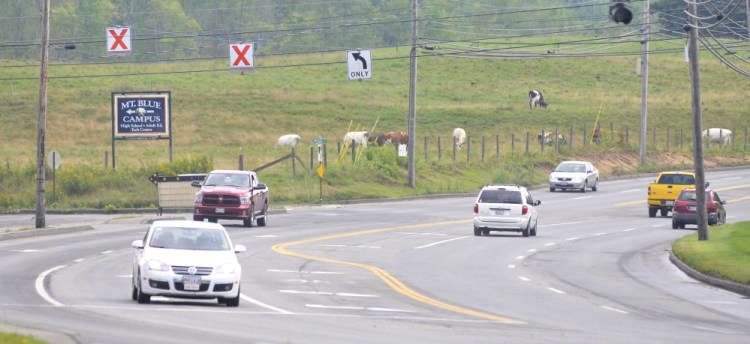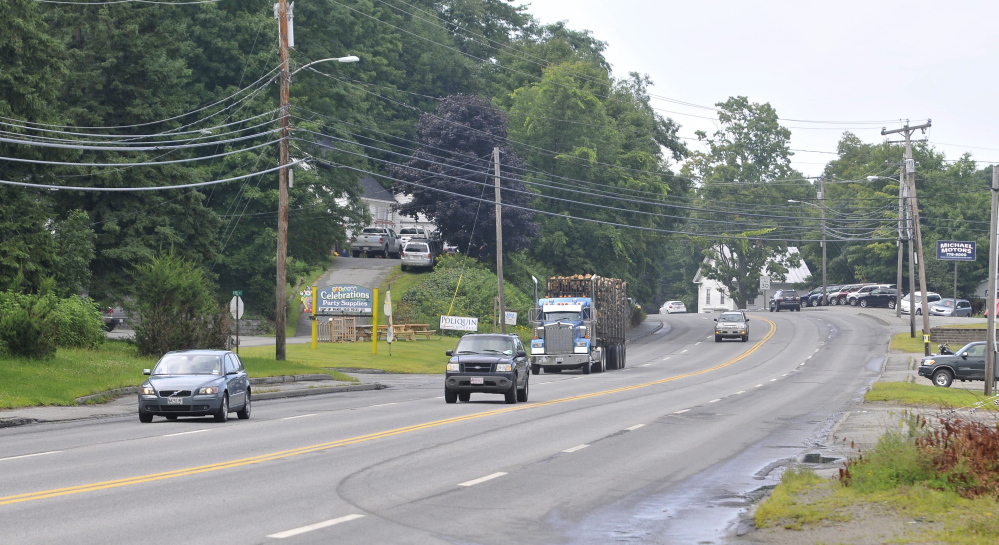A schedule for the reconstruction of U.S. Route 2 through Farmington has yet to be determined, and town officials are concerned that if they move forward with a plan for the state to fix the road in 2016, construction of a natural gas pipeline might damage the paving work soon afterward.
Summit Natural Gas of Maine is proposing to build that stretch of pipeline in 2016, which means Farmington selectmen need to decide whether to approve the state rehabilitation of Route 2 in 2016 or try to postpone the work until 2017 when the pipeline work is completed.
Town Manager Richard Davis said the board will weigh their options at the Board of Selectmen meeting 6:30 p.m. Tuesday at the Town Office.
He said one option is to request the transportation department to go ahead with the project as proposed.
If the transportation department scheduled the project and Summit wasn’t able to build pipeline until after the road was rebuilt, then the new road would need to be excavated where the pipeline would be laid.
“Which means that when the gas does come, they will have to do trench paving, which could be much more expensive for the town to maintain if there is settling or separating of paving joints,” said Davis.
While the state pays for capital improvements, such as paving, Davis said the portion of Route 2 that runs from the intersection with Main Street to Franklin Memorial Hospital falls in a zone where Farmington pays for maintenance, such as patching potholes, and would be responsible for fixing holes in the road that result from digging up relatively new pavement.
Davis said the town’s other option is to continue patching potholes as they appear until the new gas line is installed and then have the state begin the reconstruction job afterward, which could be 2017.
The pipeline through Farmington would be the second major central Maine gas pipeline. Work is already underway for Summit Natural Gas of Maine’s $350 million pipeline from Richmond to Madison. Negotiations are continuing for the second pipeline, which is proposed to connect Jay, Livermore Falls and Wilton.
When Franklin County community leaders started talks with the company, Summit officials speculated work could start on a pipeline in 2014. As the proposal was being finalized, company officials talked about doing the work in 2015. Now officials are saying the work to bring the pipeline down the portion of Route 2 known locally as Wilton Road may not be done until 2016.
Michael Duguay, director of business development at Summit, said the University of Maine at Farmington would be Summit’s largest customer and is the determining factor on whether the company would build the pipeline through the area. The university has issued a letter of intent to use natural gas and is in the midst of negotiations with Summit about the details of contracting with the utility. If built, spur lines would enable other southern Franklin County residents and businesses to switch to natural gas.
“When they would be in a position to take gas is what is really going to drive the scheduling,” said Duguay.
Duguay said the company recognizes that state and local projects are often planned years in advance, and Summit looks for chances to build just prior to road work or other utility work, so that any digging on a particular road can be done at about the same time.
“It starts out with the willingness of agencies and the gas company to work together and figure out the best way to sequence these projects,” he said. “We have this issue in almost every community … We work very, very closely with the DOT and the local communities.”
Ted Talbot, spokesman for the Maine Department of Transportation, said the project is within an urban compact zone — or an area where the town retains partial responsibility for the maintenance — so the town can make the final call on scheduling the project in conjunction with laying the natural gas pipeline.
He said on stretches of state routes outside of urban compact zones, the department generally schedules their projects after work like a pipeline installation is done and has a five-year moratorium banning excavation work after the state’s work is finished.
Kaitlin Schroeder — 861-9252
Copy the Story Link
Send questions/comments to the editors.




Success. Please wait for the page to reload. If the page does not reload within 5 seconds, please refresh the page.
Enter your email and password to access comments.
Hi, to comment on stories you must . This profile is in addition to your subscription and website login.
Already have a commenting profile? .
Invalid username/password.
Please check your email to confirm and complete your registration.
Only subscribers are eligible to post comments. Please subscribe or login first for digital access. Here’s why.
Use the form below to reset your password. When you've submitted your account email, we will send an email with a reset code.